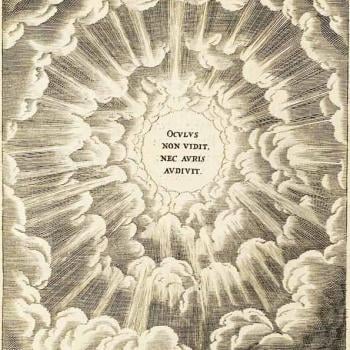 Since God transcends all things, Dionysius explained that nothing is able to know God as he is in himself. Continuing on with the relationship between God and his creation, and the knowledge that exists between them, Dionysius wrote that nor does [God] It know existing things, qua existing.
Since God transcends all things, Dionysius explained that nothing is able to know God as he is in himself. Continuing on with the relationship between God and his creation, and the knowledge that exists between them, Dionysius wrote that nor does [God] It know existing things, qua existing.
Logic can easily be employed to explain why God cannot be comprehended by any existing thing because all existing things have limits to both their potential and actual being while God has no such limit; but how can God be said not to know existing things “qua existing”? If he transcends them all, and indeed, if he created them all and gave them all their own nature as well as his deifying grace, should he not be said to know them all?
Dionysius did not disagree. God knows all things; if he did not, he would be shown to have a limit with something which lies outside of his own being. Therefore, Dionysius must be seen as writing in a suggestive way, trying to test the interpretative skills of his readers, hoping that they will see beyond the appearance of what he said and actually discern what he truly wrote. Dionysius did not deny God’s knowledge, rather, he denied God knows things in the way ordinary beings come to know other things, as Robert Grosseteste explained:
For he does not have some powers of knowledge receiving something from objects known, but rather he has a power of knowing that is beyond that, since by knowing himself in a way that is beyond being, he knows all things.[1]
Created entities, things which have their existence predicated to them, do not innately know all other things by their mere existence. They have to have some means which allow them to come to know about things which exist apart from themselves. That is, they either have some physical senses such as sight, hearing, smell touch, and taste, or through some mental sensation, they are able grasp after and engage the realm of being, coming to perceive other phenomenal objects with their intellect. God, according to Dionysius, therefore, should not be said to know other things in this manner. God does not have senses like we do; God does not them, though we can speak of God having senses through analogy as a way to suggest God knows what such senses would otherwise provide (this is often done in Scripture).
God does not come to know other things as if they existed outside of himself, as being beyond himself, but rather, in and through himself because they have their existence, their being, that is, their potential established by him. Thomas Gallus saw hinted with this the fact that all things are made in and through the Word, the Logos, and so God knows all things through their creation in the Logos: “nor does he know them as they are in themselves, but as they are in the Word.”[2] All things are given their own particular logos, reason or essence for their being, through the Logos, who establishes and molds all things in itself. This Logos, which as the Apostle John said is with God and is God (cf. Jn. 1:1), is understood to form all other logois from itself. Being logoi of the Logos, they are all derivative in nature; the Logos is unlimited, they are limited and delineated by their own internal nature or logos which allows them to be known by themselves, by others, and by God. But how all things are known differs for God with all other things. God knows all things in a way beyond ordinary means of knowing, in a way which can be said to transcend the way things are able to know themselves. He knows beyond knowing, because what we even understand by what it means to know is less than what God experiences in relation to us. Thus, Ficino commented:
Or rather, He super-understands the many in a manner that is one: super-understands composites in a simple way, changeable things unchangeably, past and future events alike in the present moment, as if all things were present to Himself.[3]
We do not know how it is to know in an eternal, unchanging way; our knowledge is achieved through a continuous grasping for the truth which lies outside of ourselves, allowing it to be constantly increasing so long as the potential for such knowledge remains. For God, what he knows, he always knows, without error, without change, as the whole of creation and created being, even time, is given a place by him and in him for all eternity. Everything is understood in a transcendent fashion, in a way which does not overcome God’s simplicity. God is one and knows in that oneness all things. We know all things in their created fashion, in plurality; we can abstract our way to understand something concerning divine simplicity and what it means for God’s knowledge but we will not know things according to such a way of knowledge because we are contingent beings; with our existence being predicated to us, all we will ever be are compound beings, and so never will we comprehend true simplicity (although we can grasp at it through various analogies). God, therefore, does not know existing things in the way existing things know other things; he knows them in a way which transcends how we come to know. But then, how can he know things in this fashion, know things as they are in themselves in a way which surpasses how they know themselves, without knowing what they know and how they know it; that is, would he not have to know things in the same manner they know it to truly know all things? But yet, he does, for he knows all things, including themselves, in a way which transcends how they know themselves, a transcendence which nonetheless includes such knowledge and does not exclude it. That is, he does not have to know with the same means as all other things to know what it is like to know through such means. He knows all things, including how and what others know of themselves, and so what it is like to know as an existing thing, not as an existing thing himself but in a transcendent sense which includes this lesser way of knowing as something one with the rest of his knowledge.
[IMG=Ptolemy By Unknown author [Public domain], via Wikimedia Commons]
[1] Robert Grosseteste, “De Mystica Theologia” in Mystical Theology: The Glosses of Thomas Gallus and the Commentary of Robert Grosseteste on De Mystica Theologia. Trans. and ed. By James McEvoy (Parish: Peeters, 2003), 119.
[2] Thomas Gallus “Exposicio” in Mystical Theology: The Glosses of Thomas Gallus and the Commentary of Robert Grosseteste on De Mystica Theologia. Trans. and ed. By James McEvoy (Parish: Peeters, 2003), 51.
[3] Marsilio Ficino, Mystical Theology in Marsilio Ficino: On Dionysius the Areopagite. Volume I: Mystical Theology and The Divine Names, Part I. trans. And ed. Michael J. B. Allen (Cambridge: Harvard University Press, 2015), 81
Stay in touch! Like A Little Bit of Nothing on Facebook

















